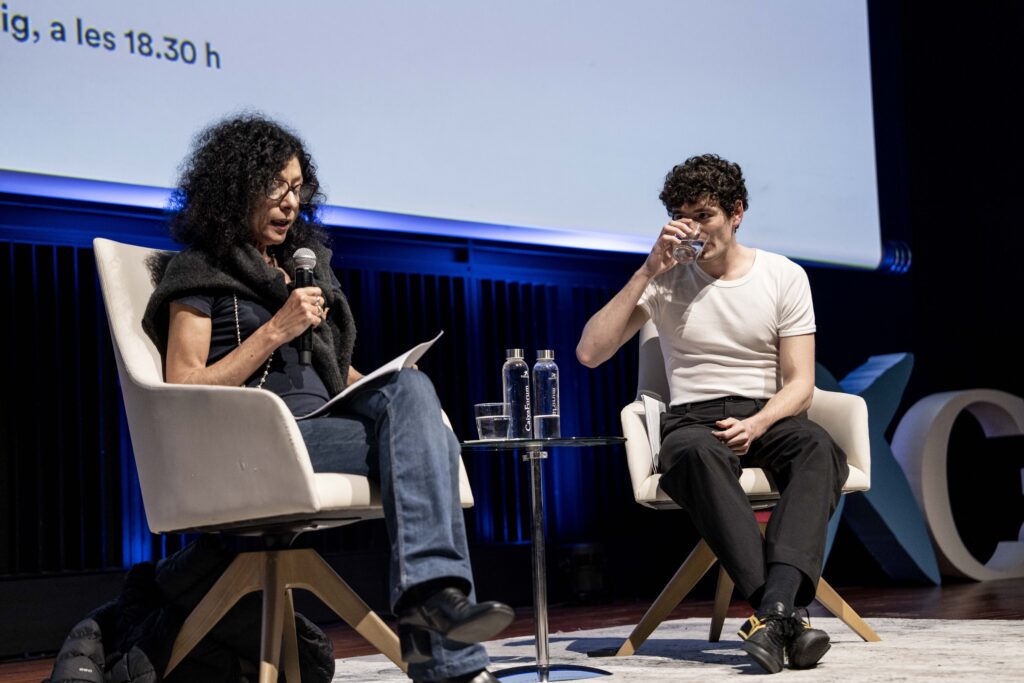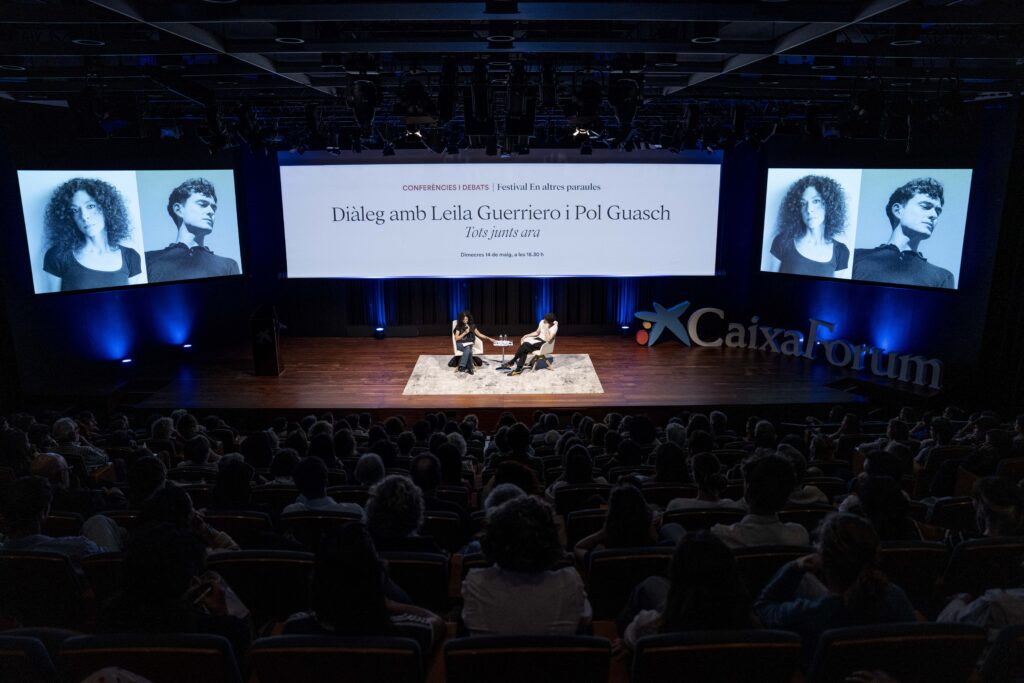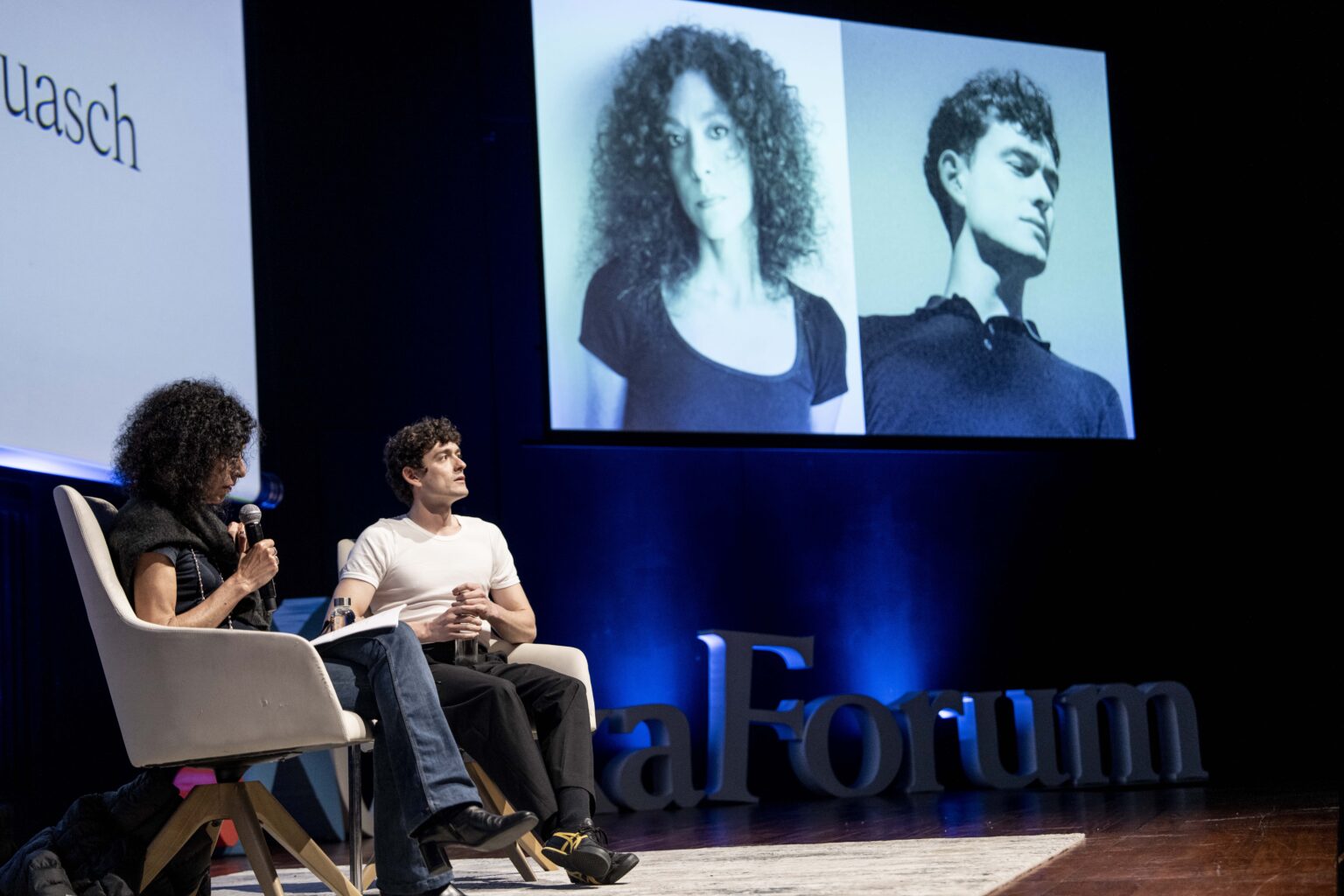Argentinian journalist Leila Guerriero and Catalan writer Pol Guasch gave a talk at CaixaForum Barcelona on writing, influences, love, and faith in language. The event was part of the En otras palabras festival and was based on an unpublished text by Guerriero entitled Todos juntos ahora (All Together Now)
For writers and readers, there are words that pierce the skin and lodge themselves in the body. At CaixaForum Barcelona, these words were brought to life by Leila Guerriero, a renowned journalist and writer from Junín, Argentina, who is celebrated for her work in narrative journalism. She is the author of books such as Los suicidas del fin del mundo (The Suicides of the End of the World), Una historia sencilla (A Simple Story) and La llamada (The Call), and is considered one of the leading figures in contemporary chronicles. As part of the En otras palabras (In Other Words) festival, Guerriero read an unpublished text entitled Todos juntos ahora (All Together Now), written especially for the occasion. This served as a catalyst for a conversation with the poet and writer Pol Guasch (Tarragona, 1997), the author of the award-winning Napalm al cor (Napalm to the Heart), as well as the poetry collections Tanta ganà (So Much Desire) and La part del foc (The Part of Fire), and the recent novel Ofert a les mans, el paradís crema (Offer in the Hands, Paradise Burns) (Anagrama, 2024). What followed was not an exchange, but an act of complicity and a way of thinking out loud together, filled with readings, confessions and lucid digressions.
What are voices made of?
Guerriero spoke of influences, but not in the sense of ordering a literary genealogy. Rather than seeking to fit into an illustrious lineage, her text aimed to accurately describe the mysterious way in which certain works, gestures and phrases infiltrate writing, like a spore or a virus. “Influences are like livers, pancreases and hearts, especially hearts,” she stated, “which are added to the macrocephalic body that is writing.” Some influences arrive as epiphanies; others creep in slowly. Some are prestigious, such as the Beatles’ song ‘All Together Now’, whose echo crept into the title of the read text. Others, like Flashdance, offer only violent joy, which can save one’s life without one’s knowledge.
“A good influence settles, does mysterious work, and ultimately leaves us alone,” said Guerriero. However, it has not always been easy to accept these influences. Referring to Harold Bloom’s famous theory of the ‘anxiety of influence’, Guerriero evoked the tension between admiration and debt, legacy and paralysis. Bloom argued that no truly strong author can fully accept the idea of not having invented themselves. He claimed that every significant literary work emerges from a struggle with the past, a symbolic assassination of those who came before us. However, Guerriero distanced herself from this interpretation, aligning herself instead with ‘the club of Zambra and the club of Fabián Casas’. ‘Influence is a blessing, not something to be overcome. It is both a miracle and a catastrophe because it alters your perspective. If your perspective changes, your style changes to a certain extent. If your style changes, everything changes.’

Writing as an act of love
When Pol Guasch joined the conversation, the discussion shifted towards other topics. He talked about the body, time, desire and forgetting. With the enthusiasm of a television presenter, he asked Guerriero whether she thought she was the writer she wanted to be. She hesitated. “I’m kind of on the road. I’m not quite there yet, because I still have a lot to polish and refine. I’m curious to see how my writing will have changed in five years,” she added, jokingly clarifying that answering yes would have been too arrogant.
Guasch returned to an idea that had been discussed the previous night during their meeting in Palma: writing as an act of love. It was he who drew the parallel between writing and loving, not as a romantic metaphor, but as a gesture of faith. ‘Love is a state of faith in which one must necessarily be, because if one is not, one will not see the insignificant things about that person as valuable. Others see an absurd smile, but you see the love of your life.’ The lyrical dart thrown by the poet was a way of naming what unites true acts of creation. Writing and love cannot exist without that incomprehensible surrender to the invisible and the unproven.
Faith and the dishwasher
Guerriero emphasised the importance of faith in writing, but not in the sense of blind faith; rather, he saw it as a form of openness. It is the confidence that something — invisible, banal or unexpected — can contain a seed of meaning. When it comes to creative block, he said that the breakthrough sometimes comes during everyday activities such as running, showering or washing dishes. “Some colleagues and I have long conversations about the benefits of washing dishes,” she said, laughing. This wasn’t a forced metaphor; for Guerriero, the simple repetition of these actions without expectation opens up a mental space in which latent intuition can suddenly take shape.
The writer illustrated this with a specific anecdote: ‘Sometimes the text doesn’t move forward, and then suddenly… a misread sentence gives you an entire column.’ This was in reference to a reading in which he had confused la fiesta fantástica (the fantastic party) with la fantástica desgracia (the fantastic misfortune). The mistake was so fertile that Guerriero ended up writing twenty columns based on it. However, this example was no whim; it was a way of showing that writing also means paying attention to the insignificant. Often, the discovery does not come from order, but from error, from deviation, from slips of the tongue.
Perhaps the most important thing in writing is at stake in that gesture — seeing value where there is none, or where there is not yet any. Not control, not technique, not mastery. Rather, it is a radical openness. The possibility that a mistake can trigger a revelation. That a misunderstanding can reveal a truth. The idea that something as simple as a poorly rinsed plate, a misread sentence or a poorly stored memory can contain the spark of something that has not yet been written.

Against the commonplace
The conversation also touched on the tension between fiction and non-fiction, autofiction and chronicle, and literature and the market. Guasch posed the question: what is happening to fiction? Guerriero responded cautiously, avoiding any apocalyptic pronouncements. ‘Every country is a world unto itself. There are a thousand trends, many of them contradictory. The idea that autofiction is in vogue or that the novel is dead… I’ve heard that five times in the last ten years.’
However, what she did defend strongly was rigour. On this subject, Pol Guasch mentioned the writer Alexander Chee, who claims that the hard part is not starting to write but continuing. Chee also warns against the temptation to give in to clichés — that inertia which threatens even the most attentive writer.
It’s not just about sitting down to write; it’s about staying there, despite yourself. Guerriero spoke from experience: ‘There’s a part of the process that’s very painful. When you’re working with a huge amount of material — interviews and archives — it all seems like an impossible mass. You ask yourself, ‘Who the hell told me to write this?’ But at some point, something clicks. Sometimes while you’re running. Sometimes while you’re washing the dishes.
The conversation did not end, as true conversations never do. Nor did it seek definitive answers. What Leila Guerriero and Pol Guasch offered was a way of approaching writing: with fear, desire and memory. With the humility of those who know that there are no manuals. They also had the faith of those who leap into the void, because, as Guerriero reminded us, ‘the greatest proof of love is throwing yourself backwards from the top of a rock into the arms of your lover waiting below’.
Writing, at its core, is just that: Leaping without certainty, influenced by everything and everyone, in an attempt to be — if only for a moment — better than yourself.



